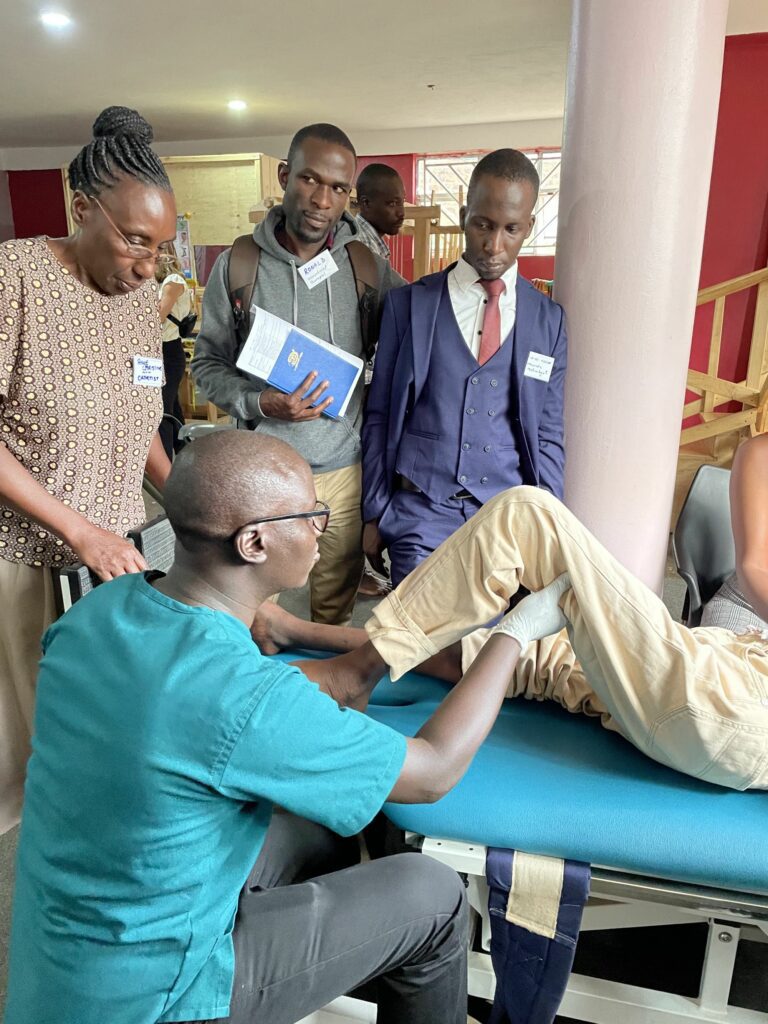
By Sarah Magoba for ReLAB-HS
“If identification and referral are strengthened…imagine the change this will create in the lives of persons in need of rehabilitation and AT services.”
– Waiswa Simon, Health Assistant, Mayuge Health Centre IV
Ivan Mugabi, a three-year-old living in Kasugu B village in the district of Mayuge, Uganda, was born with a congenital abnormality of the lower limbs, which affects his mobility. As he grew, he was not able to walk and his mobility was limited to crawling, an experience that has been very difficult for his parents. Concerned, they took Ivan to CoRSU Rehabilitation Hospital in Entebbe. The CoRSU hospital providers informed them that Ivan needed an operation to improve his condition; but they could not afford the costs involved and returned home. Though Ivan had some mobility, his parents decided to keep him at home.
Gloria Namusisi, Ivan’s mother, said her husband told her never to leave the house with Ivan, and the few times they traveled, she would cover him with extra clothing so people could not see his condition. “I have lived in this life situation for over three years and I would not feel free to associate with my fellow women in the village due to fear and stigma,” she shared.
To improve access and increase awareness of rehabilitation services at the community level, Learning, Acting, and Building for Rehabilitation in Health Systems (ReLAB-HS) supported the Mayuge district local government to train community health workers—village health teams (VHTs) and community health extension workers (CHEWs)—on rehabilitation and assistive technology (AT). The training oriented the VHTs and CHEWs primarily on how to identify and refer individuals who may need rehabilitation and/or AT services within their communities.
Zakiah Byobona, a CHEW working in Kasugu B village, put this training into practice. She made several attempts to reach Ivan’s family. At first, Ivan’s mother refused to open the door for Zakiah. She recalled her hesitation, sharing, “I [had] a lot of fear and am not sure if my husband would accept me to take the child anywhere. When he returned, I Informed him and he seemed not interested to have the child taken for assessment at any health facility.”
Though it took time, Zakiah was able to effectively connect with Ivan’s mother, informing her that health care services are available for Ivan’s condition and that his disability is not a disease. “Opening about the child was not easy for her, but through continuous counseling and support, Ivan’s father later accepted and allowed her to take the child to the health facility,” said Zakiah.
Health workers at the primary health care facility talked to Ivan’s mother about his condition and explained that his mobility could be improved by using assistive technology like a wheelchair. They encouraged Ivan’s parents to allow Ivan join a nursery school, so he could play and engage with other children, instead of keeping him at home.
Seeing what was now possible for Ivan, Ivan’s mother expressed her relief, saying, “I feel happy now that my child can be able to move out of the house. I have been able to overcome fear through the counselling and referral.”
By integrating rehabilitation services inclusive of AT at the community level and effectively connecting clients to appropriate services, ReLAB-HS is improving access for all who need them, offering hope through practical solutions.